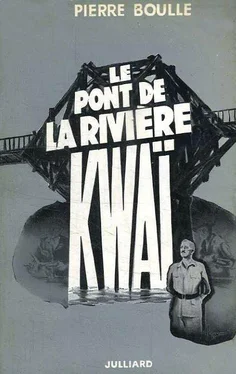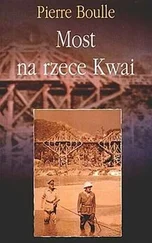Every bridge was not equally attractive to Force 316. Number One agreed with Colonel Green that they should not put the Japs on their guard before the railway was completed by attacking relatively unimportant targets. He had therefore decided that the team should lie low in the hide-out for the time being and do no more than collate and co-ordinate the information of the native agents.
“It would be silly to spoil the whole show by blowing up a few trucks just for the fun of the thing,” he would sometimes say in order to curb his companions’ impatience. “We want to start off in a really big way. That will enhance our reputation in the country and make the Siamese look up to us. Let’s wait till the trains start running.”
Since his firm intention was to start of! “in a big way,” it was clear that the less important bridges had to be excluded. The result of the initial blow was to compensate for the long period of inactivity and preparation and to endow the mission, in his own eyes at least, with an aura of success, even if circumstances dictated that nothing else should come of it. Shears knew that one could never be certain of a first attack being followed up by a second. He kept this to himself, but his two companions had realized the reasons for his plan, and the discovery of this ulterior motive had not worried ex-professor Warden, whose rational mind approved of such methods of seeing and foreseeing.
It had not seemed to worry Joyce either, nor had it dampened the enthusiasm he had felt at the prospect of a worth-while attack. On the contrary, it seemed to have spurred him on to greater efforts and made him concentrate all his youthful powers on this probably unique opportunity, on this unhoped-for target suddenly flashing in front of him like a lighthouse, casting its brilliant beams of success onto the past for all eternity, lighting up with its magic flames the gray gloom which had so far dimmed his path.
“Joyce is right,” said Warden, as sparing as ever in his speech. “There are only three worth-while bridges. One of them is Camp Three’s.”
“We’ll have to give that one up, I’m afraid,” said Shears. “The open ground doesn’t lend itself to attack. Apart from that, it’s in flat country. The banks are low. It would be too easy to repair.”
“The other one’s near Camp Ten.”
“It’s worth considering. But it happens to be in Burma, where we haven’t the support of the native partisans. Besides…”
“The third one, sir,” Joyce suddenly said, without realizing he was butting in on his C.O.’s conversation, “the third one’s the bridge on the River Kwai. It hasn’t any of those drawbacks. The river’s four hundred feet across, with steep, high banks on both sides. It’s only two or three days’ march from here. The area’s practically uninhabited and covered in jungle. We could approach it without being observed and command it from a hill from which the whole valley’s visible. It’s a long way from the nearest large town. The Japs are taking special care over its construction. It’s bigger than all the other bridges and has four rows of piles. It’s the most important job on the whole line, and the best-placed one.”
“You seem to have studied the agents’ reports pretty thoroughly,” observed Shears.
“They’re quite clear, sir. It seems to me that this bridge…”
“I can see that the Kwai bridge is worth considering,” said Shears, as he leaned over the map. “Your judgment’s not so dusty for a beginner. Colonel Green and I had already noted that particular crossing. But our information’s not yet sufficiently complete; and there may be other bridges which could be more easily attacked. And how far has the work progressed on this wonderful bridge, Joyce, which you talk of as though you had actually seen it?”
The work was well under way. The British soldier is by nature hard-working and puts up with strict discipline without a murmur, provided he has confidence in his officers and starts the day off with the prospect of unlimited physical exercise to counteract any nervous tension.
The soldiers in the River Kwai camp had a high opinion of Colonel Nicholson—and who would not have after his heroic resistance? Besides, the sort of work they were doing did not involve much thought. So after a short period of indecision, during which they tried to get to the bottom of the C.O.’s real intentions, they had set to work with a will, eager to show their skill as builders now that they had proved their cunning as saboteurs. In any case, Colonel Nicholson had taken steps to avoid any chance of misunderstanding, first by delivering an address in which he explained quite clearly what was expected of them, and secondly by inflicting severe punishments on a few recalcitrants who had not fully understood. This action had seemed so well intended that the victims did not hold it against him.
“Believe me, I know these fellows better than you do,” was the Colonel’s retort to Clipton, who had dared to protest against the set task, which he considered too heavy for men who were undernourished and in a poor state of health. “It’s taken me thirty years to get to know them. Nothing’s worse for morale than inactivity, and their physical welfare depends largely on their morale. Troops who are bored, Clipton, are troops doomed in advance to defeat. Let them get slack and you’ll see an unhealthy spirit developing in the unit. But fill every minute of their day with hard work, and cheerfulness and health are guaranteed.”
“Be happy in your work!” murmured Clipton disloyally. “That was General Yamashita’s motto.”
“And it’s not such a bad one, Clipton. We shouldn’t hesitate to adopt a principle of the enemy’s if it happens to be a good one. If there wasn’t any work for them to do, I’d invent some for them. As it is, we’ve got the bridge.”
Clipton could find no words to express what he felt and could only sullenly repeat:
“Yes, we’ve got the bridge all right.”
In any case, the British soldiers had already revolted on their own against an attitude and code of behavior which clashed with their instinctive urge to do a job properly. Even before the Colonel intervened, subversive activity had become for most of them a distasteful duty, and some of them had not waited for his orders before using their muscles and tools to proper purpose. It was their natural reaction, as Westerners, to make a loyal and considerable effort in return for their daily bread, and their Anglo-Saxon blood encouraged them to concentrate this effort on something solid and constructive. The Colonel had not been wrong about them. His new regime led to a rise in morale.
Since the Japanese soldier is equally well disciplined and hard-working, and since Saito had threatened to string his men up if they failed to prove themselves better workers than the British, the two stretches of line had been quickly completed, while the huts for the new camp had been erected and made habitable. At about the same time Reeves had put the finishing touches to his plans and passed them to Major Hughes, who was thus drawn into the scheme and given a chance to show what he was worth. Thanks to his organizing ability, his knowledge of the troops, and his experience of how manpower can be most effectively employed, the labor under his direction achieved tangible results from the very start.
The first thing Hughes did was to divide the personnel into different groups and allot a specific task to each, so that while one was occupied with cutting down trees, another would be trimming the trunks, a third making the beams, while the largest of all was engaged in pile driving, and many more were employed on the superstructure and platform. Some of the teams—not the least important ones, in Hughes’s opinion—were made up of various experts in such tasks as the erection of the scaffolding, the transport of the materials, and the maintenance of the tools: tasks of secondary importance to the actual construction work, but to which Western foresight devotes— and not without reason—as much care as to the immediately productive work.
Читать дальше











